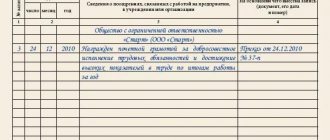Review of judicial practice of bringing to subsidiary liability
Below we will consider the procedure and the possibility of bringing the debtor’s manager to subsidiary liability.
According to the explanations set out in paragraph 26 of the resolution of the Plenum of the Supreme Court of the Russian Federation dated December 21, 2017 No. 53 “On some issues related to bringing persons controlling the debtor to liability in bankruptcy,” the presumption of bringing to bankruptcy as a result of a tax offense can be applied to the controlling person person upon proof of the following set of circumstances:
- the debtor is brought to tax liability for non-payment or incomplete payment of tax amounts (fees, insurance contributions) as a result of understatement of the tax base (base for calculating insurance premiums), other incorrect calculation of taxes (fees, insurance contributions) or other illegal actions (inaction).
- additional amounts of tax (levy, insurance premiums) accrued based on the results of tax control measures amounted to more than 50 percent of the total amount of the principal debt to registered creditors of the third priority of satisfaction. 6 This presumption applies when bringing to subsidiary liability both the head of the debtor (actual and nominal) and other persons recognized as controlling persons at the time of the commission of a tax offense (clause 5 of Article 61.11 of the Bankruptcy Law).
Illegal actions (inaction) of a controlling person can be expressed, in particular, in making key business decisions in violation of the principles of good faith and reasonableness, including coordination, conclusion or approval of transactions on obviously unfavorable terms or with a person obviously unable to fulfill an obligation (“fly-by-night company”) ", etc.), giving instructions regarding the performance of clearly unprofitable transactions, appointing to leadership positions persons whose performance results will obviously not correspond to the interests of the headed organization, creating and maintaining a debtor management system that is aimed at systematically benefiting a third party to the detriment of the debtor and his creditors, etc.
The above arguments are indicated in the Resolution dated August 24, 2018. of the Seventh Arbitration Court of Appeal, in case No. A27-4829/2017, approved by the Ruling of the Supreme Court of the Russian Federation dated July 22, 2019.
As stated in the Resolution of the Sixth Arbitration Court of Appeal in case No. 06AP-3388/2018 dated August 15, 2021, the following is stated:
From the above set of circumstances it follows that one of the reasons for the insolvency of Spetsstroymontazh LLC and the inability to pay off creditors’ claims was the additional assessment of taxes made as a result of violations identified as a result of an on-site tax audit.
In paragraph 16 of the Resolution of the Plenum of the Supreme Court of the Russian Federation dated December 21, 2017 N 53 “On some issues related to holding persons controlling the debtor liable in bankruptcy” the following is stated:
Illegal actions (inaction) of a controlling person may be expressed, in particular, in making key business decisions in violation of the principles of good faith and reasonableness, including coordination, conclusion or approval of transactions on obviously unfavorable terms or with a person obviously unable to fulfill an obligation (“On Insolvency ( bankruptcy)" clause 3.1 on the obligation of other persons controlling the debtor to file an application for declaring him bankrupt if such an application was not filed by the head of the debtor.
4.2. As noted by the Constitutional Court of the Russian Federation, paragraphs 1 and 3 of Article 59 of the Federal Law “On Insolvency (Bankruptcy)” operate in a systematic connection with its other provisions, in particular with paragraph eight of paragraph 1 of Article 57, according to which the arbitration court terminates proceedings in the case of bankruptcy in the absence of funds sufficient to reimburse legal costs for the procedures applied in the bankruptcy case, the costs of paying remuneration to the arbitration manager (Definitions dated November 1, 2012 N 2047-O and dated September 29, 2016 N 1975-O).
Thus, the failure of the debtor’s manager to fulfill the obligation to file an application for declaring the debtor bankrupt in the arbitration court in cases provided for by law does not in itself entail inevitable expenses of the authorized body. The occurrence of such expenses, since the authorized body is not obliged in all cases to submit the specified application in the presence of a corresponding debt, is associated both with the proactive behavior of this body itself, the adequacy of its assessment of the financial condition of the debtor, and with the actions and decisions of other persons, including the arbitration a manager who, by virtue of paragraph 4 of Article 20.3 of this Federal Law, when carrying out procedures applied in a bankruptcy case, is obliged to act in good faith and reasonably in the interests of the debtor, creditors and society.
Without studying the circumstances confirming or refuting the reasonableness and prudence of the actions (inaction) of all persons who influenced the occurrence and amount of expenses in the bankruptcy case (the head of the debtor himself, other persons controlling the debtor, the authorized body, the arbitration manager and others), it is impossible to unambiguously establish that the occurrence of losses by the authorized body is associated solely with the unlawful behavior of the debtor’s manager, which was expressed in the failure to file an application for declaring the debtor bankrupt. Recovery from the debtor's manager in full of the relevant expenses, including due to an incorrect assessment by the authorized body and other persons of the possibility of their repayment at the expense of the debtor's funds, would not meet the general principles of legal liability, would lead to a violation of the rights of the debtor's manager, and thus would most contradict Articles 19 (parts 1 and 2), 34 (part 1), 35 (parts 1 and 3) and 55 (part 3) of the Constitution of the Russian Federation.
As stated in the operative part:
Recognize the interrelated provisions of Articles 15 and 1064 of the Civil Code of the Russian Federation, paragraph two of paragraph 1 of Article 9, paragraph 1 of Article 10 and paragraph 3 of Article 59 of the Federal Law “On Insolvency (Bankruptcy)” as not contradicting the Constitution of the Russian Federation, since in their constitutional and legal meaning in system of the current legal regulation, they do not imply recovery from the head of the debtor organization, who did not timely apply to the arbitration court with the debtor’s application for declaring the organization he heads bankrupt, losses in the amount incurred by the tax authority that initiated the bankruptcy case, legal costs and expenses for paying remuneration to the arbitration tribunal to the manager without establishing all the elements of the relevant civil offense committed by the debtor’s manager, as well as without assessing the reasonableness and prudence of the actions (inaction) of all persons who influenced the occurrence and amount of expenses in the bankruptcy case (the debtor’s manager himself, other persons controlling the debtor, the authorized body, arbitration manager and others).
In accordance with clause 10 of the Resolution of the Plenum of the Supreme Court of the Russian Federation dated December 21, 2017 N 53 “On some issues related to holding persons controlling the debtor liable in bankruptcy”
The fulfillment by the manager of the obligation to apply to the court with the debtor's application for his own bankruptcy, as follows from Article 9 of the Bankruptcy Law, does not depend on whether the debtor has funds sufficient to finance bankruptcy procedures. Within the meaning of paragraph 5 of Article 61, paragraph 2 of Article 62 of the Civil Code of the Russian Federation, if the debtor’s property is insufficient for these purposes, the necessary expenses can be attributed to its founders (participants).
In accordance with clause 8, the head of the debtor may be held vicariously liable under the rules of Article 61.12 of the Bankruptcy Law if he has not fulfilled the obligation to submit to the court the debtor’s application for his own bankruptcy within the month established by paragraph 2 of Article 9 of the Bankruptcy Law.
Clause 1 of Article 61.12 of the Federal Law on Bankruptcy Failure to fulfill the obligation to submit the debtor’s application to the arbitration court (convening a meeting to make a decision on applying to the arbitration court with the debtor’s application or making such a decision) in cases and within the period established by Article 9 of this Federal Law , entails subsidiary liability of persons who are charged by this Federal Law with the obligation to convene a meeting to make a decision on filing the debtor’s application with the arbitration court, and (or) making such a decision, and (or) filing this application with the arbitration court.
In accordance with clause 1 of Article 9 of the Federal Law on Bankruptcy, the head of the debtor is obliged to apply with the debtor to the arbitration court if:
satisfaction of the claims of one creditor or several creditors leads to the impossibility of the debtor fulfilling monetary obligations or obligations to pay obligatory payments and (or) other payments in full to other creditors;
the body of the debtor, authorized in accordance with its constituent documents to make a decision on the liquidation of the debtor, made a decision to apply to the arbitration court with an application from the debtor;
the body authorized by the owner of the property of the debtor - a unitary enterprise, made a decision to apply to the arbitration court with an application from the debtor;
foreclosure on the debtor's property will significantly complicate or make impossible the debtor's business activities;
the debtor meets the signs of insolvency and (or) signs of insufficient property;
there is an outstanding debt for more than three months due to insufficient funds in the payment of severance pay, wages and other payments due to the employee, former employee in the amount and in the manner established in accordance with labor legislation;
Thus, failure to file a bankruptcy petition on behalf of the debtor is not in itself a presumption of guilt and is not sufficient to hold the debtor's directors and officers liable.
Consequences of holding a manager vicariously liable.
The entry into force of Article 61.17 of the Bankruptcy Law and the adoption of paragraph 45 of the Resolution of the Plenum of the Supreme Court of the Russian Federation dated December 21, 2017 No. 53 “On some issues related to bringing persons controlling the debtor to liability in bankruptcy”, specified the procedure for applying the general provisions on procedural succession during the consideration bankruptcy cases, but does not indicate the introduction of a different, previously not regulated by law, procedure for replacing persons in cases considered by arbitration courts, including in bankruptcy cases.
The current provisions of Article 61.17 of the Bankruptcy Law provide that each creditor, in whose interests a person is brought to subsidiary liability, has the right to choose the method of disposing of the right to claim for subsidiary liability, including the assignment of part of this claim (subparagraph 3 of paragraph 2 of Article 61.7 of the Law about bankruptcy).
As confirmed by the Arbitration Court of the Central District on February 1, 2019, in case No. A35-377/2014, the Federal Tax Service has the right to demand the assignment of part of the funds collected as part of the procedure for bringing the debtor’s manager to subsidiary liability.
Thus, the court confirmed the possibility of transferring part of the claims by the tax authority, bypassing auctions for the sale of debt to third parties.
Administrative liability after bringing to subsidiary liability.
Based on the decision of the Leninsky District Court of Kursk in case No. 2-5395/12-2016. from November 21, 2016 the head of the company in respect of whom the bankruptcy procedure was initiated, and subsequently terminated, due to insufficient property, the losses incurred for the bankruptcy procedure were recovered from the head of the company.
Based on clause Article 14.13 of the Code of Administrative Offenses of the Russian Federation, failure to comply with a judicial act that has entered into legal force on bringing persons controlling the debtor to subsidiary liability for the obligations of a debtor declared bankrupt, provided that such an action does not contain a criminal offense, except in cases where this judicial the act was appealed to the cassation court and the cassation court did not issue a judicial act on it or the period for appealing the judicial act on bringing to subsidiary liability in the cassation court has not expired
Disqualification consists of depriving an individual of the right to fill positions in the federal state civil service, positions in the state civil service of a constituent entity of the Russian Federation, positions in the municipal service, hold positions in the executive body of a legal entity, join the board of directors (supervisory board), carry out entrepreneurial activities in managing a legal entity. person, as well as to manage a legal entity in other cases provided for by the legislation of the Russian Federation (Article 3.11 of the Code of Administrative Offenses of the Russian Federation).
For example, based on the decision of the Arbitration Court of the Kursk Region dated July 11, 2021 in case No. A35-3977/2017, the former head of the company was prosecuted under Article 14.13 of the Code of Administrative Offenses of the Russian Federation, due to failure to comply with a judicial act on bringing to subsidiary liability.
The courts do not hold the debtor’s manager accountable only if the statute of limitations has expired, as for example in the Decision of the Arbitration Court of the Kursk Region dated April 2, 2021 in case No. A35-6969/2018.
CONCLUSIONS:
1. An initial assessment of the property, which will fully cover the debt to creditors, but subsequently after the sale will not be able to do this; in this case, this does not provide guarantees against the impossibility of bringing to subsidiary liability.
2. If the director of the company is brought to subsidiary liability, the amount of claims may go to the Federal Tax Service immediately after the issuance of a judicial act.
3. An unconditional basis for releasing the liability of the debtor’s manager from subsidiary liability can only be external factors, for example, the global crisis, sudden changes in the political situation, exchange rate, embargo on the supply of goods necessary for society, etc.
Plenum of the RF Armed Forces No. 53 on subsidiary liability
18.01.2018
Estimated reading time: 9 min.
Yulia Litovtseva
On December 21, 2017, the Plenum of the Supreme Court of the Russian Federation adopted Resolution No. 53 “On some issues related to holding persons controlling the debtor liable in bankruptcy,” which provides clarifications both regarding the general principles and grounds for holding persons controlling the debtor liable, and regarding procedural issues of filing and consideration of applications for prosecution.
Below are the most significant clarifications.
The exclusive nature of subsidiary liability
Against the background of a significant expansion of the practice of bringing controlling persons to subsidiary liability, the RF Armed Forces emphasized the exceptional nature of such liability. The Supreme Court of the Russian Federation noted the importance of the structure of a legal entity and the inadmissibility of liability if the actions that led to negative consequences for the debtor did not go beyond the limits of ordinary business risk and were not aimed at violating the rights of creditors. In this case, courts should be guided by the practice of protecting a business decision that has developed in corporate relations.
The Supreme Court also pointed out the subsidiary application of the general provisions of Chapters 25 and 59 of the Civil Code of the Russian Federation on liability for violation of obligations and on obligations resulting from causing harm.
The criteria for recognizing a person as a controller are detailed
The Resolution places emphasis on an informal approach when establishing the status of a controlling person and the need to proceed from the actual exertion by the controlling person of a decisive influence on the terms of transactions that change the economic or legal fate of the debtor, as well as taking into account the advantages arising from the position of the persons held accountable. At the same time, the absence of grounds for subsidiary liability does not exclude the holding of the controlling person to liability by virtue of other rules.
The Supreme Court of the Russian Federation clarified that both the management company of the debtor and the head of such a company can be recognized as persons controlling the debtor, and the nominal manager, as a general rule, is subject to liability along with the persons who actually managed the company.
It is not excluded that a participant holding less than 50% of the votes (shares) or a member of the debtor’s management body who voted together with other persons for decisions that had a significant impact on the company’s activities cannot be recognized as controlling.
The Supreme Court has detailed the concept of benefit required to apply the presumption of control in connection with the receipt of benefit. Firstly, the benefit must be significant relative to the scale of the debtor’s activities, and secondly, its extraction is impossible in a situation where the debtor’s management conscientiously carries out its duties.
The circle of persons and the grounds for bringing to responsibility for failure to submit (untimely filing) the debtor’s application for personal bankruptcy are detailedIt is clarified that the constituent document of the power to apply to the court for the debtor's own bankruptcy cannot be granted to only one of its directors, and as a general rule, several directors, acting jointly or independently of each other, are jointly and severally liable. The debtor's manager may be released from liability if:
Limitation of the manager's liability is possible only for the period when the implementation of such a plan was reasonable
The Supreme Court also softened the conditions for the liability of persons other than the manager (for example, a participant or shareholder) for failure to take measures to initiate bankruptcy, emphasizing that such persons must be aware of the manager’s obligation to apply to the court for bankruptcy and his failure to comply this responsibility. The resolution contains an explanation that the liability of such a person is limited to the obligations of the debtor that arose after the expiration of the set of deadlines allotted for convening, preparing and holding a meeting of the authorized management body of the debtor. The Supreme Court of the Russian Federation drew attention to the fact that for the liquidator and members of the liquidation commission, the period for filing an application for bankruptcy of the debtor is not 1 month, but 10 days, and that for members of the liquidation commission, as a general rule, liability for failure to fulfill the corresponding obligation is joint and several. The amount of liability for failure to take measures to initiate bankruptcy of the debtor may be increased by the amount of expenses necessary to carry out bankruptcy procedures if it is proven that it would have been less if the controlling person had timely fulfilled the obligation to file a bankruptcy application. Publication by a former manager of information about the occurrence of the obligation to file a bankruptcy petition in court releases such manager from liability for obligations to creditors that arose after such publication. The grounds for subsidiary liability for the impossibility of full repayment of creditors' claims have been clarifiedThe Supreme Court of the Russian Federation directs the courts to the need to establish the actions of controlling persons that were the necessary reasons for the objective bankruptcy of the debtor. Such actions can be expressed, in particular, in making key business decisions in bad faith and unreasonably, in appointing people to leadership positions whose results will obviously not correspond to the interests of the organization, in creating a management system in which third parties benefit from its activities to the detriment of the debtor faces, etc. The need to study the totality of transactions and other operations is especially noted, since the last transaction (operation) cannot be recognized as the only prerequisite for bankruptcy, even if it led to a critical change in the previously unfavorable financial situation. The Supreme Court of the Russian Federation draws attention to the importance of assessing both internal and external factors that could lead to the impossibility of fully repaying creditors’ claims (financial crisis, significant change in business conditions, etc.). Since joint liability presupposes the consistency, coordination and focus of the actions of the controlling persons towards the implementation of their common intention, under certain circumstances it is possible to replace this form of liability with a proportional one, for example, depending on the periods of their actual control over the debtor. Write-off by the creditor, including the authorized body in accordance with Art. 59 of the Tax Code of the Russian Federation, debt, is not an obstacle to the subsequent filing of an application to hold the controlling person liable for such obligations, nor is it the only basis for excluding the amount of debt from the scope of subsidiary liability.
The court has broad powers in the matter of qualifying the legal grounds of the stated claim.Regardless of how the applicant named the type of liability and what rules of law he referred to, the court independently qualifies the presented claim. If the grounds for imposing subsidiary liability are not proven, but the grounds for applying other types of liability are proven, the court makes a decision on imposing such liability.
The effect of the presumption related to the absence or unreliability of the debtor’s documentation has been clarifiedThe Supreme Court clarified the criteria for significant difficulty in conducting bankruptcy procedures, which are necessary for the application of this presumption, and also indicated that the failure of the previous manager to transfer the necessary documents to the new one does not relieve the latter from liability. A conscientious and reasonable manager should request documentation from his predecessor or try to restore the documentation in another way. The procedure for filing and considering an application to hold persons controlling the debtor accountable has been clarifiedThe Supreme Court clarified the rights of individual entities to initiate the bringing of controlling persons to subsidiary liability. Thus, “registered” creditors (clause 4 of Article 142 of the Bankruptcy Law), as well as creditors for current obligations, have the right to make such an application. At the same time, filing an application outside the framework of a bankruptcy case is possible only if the requirements are confirmed by a judicial act that has entered into legal force or by another document subject to forced execution by law. The basis for the requirement to bring to subsidiary liability, according to the Supreme Court of the Russian Federation, is not references to the rules of law, but the actual circumstances of the dispute. For this reason, filing a claim with reference to the same rules of law, but based on different violations, will not be considered an identical claim. In relation to the burden of proof, the Supreme Court of the Russian Federation explained that if the arbitration manager and (or) creditors, using indirect evidence, convincingly substantiate the status of the controlling person and the impossibility of repaying the creditors' claims due to the actions (inaction) of the latter, the burden of refuting these statements passes to the person involved.
The features of the application of the statute of limitations to the requirement to bring to subsidiary liability are revealedThe Resolution of the Plenum of the Armed Forces of the Russian Federation regulates in detail the procedure for calculating the limitation period, taking into account the large range of possible applicants for the requirement to bring to subsidiary liability. In particular, if it is established that one of the creditors knew or should have known about the existence of grounds for liability before other creditors could know about it, the limitation period may be applied to the part of the claim for subsidiary liability attributable to such an informed creditor. It is also noted that the limitation period for creditors cannot be calculated from the moment when the bankruptcy manager learned about the circumstances that are the grounds for holding the controlling persons liable if he hid this information from the bankruptcy creditors in bad faith. Incentive remuneration for an arbitration managerThe amount of such remuneration depends on the results of the manager’s work and his real contribution to bringing the persons controlling the debtor to justice, in connection with which the amount of remuneration may be reduced or its payment may be refused. The actual paid amounts of the arbitration manager's remuneration are subject to recovery from the controlling debtor as legal expenses
What to think about, what to doResolution of the Plenum of the Supreme Court of the Russian Federation No. 53 guides the courts towards a balanced application of liability mechanisms in bankruptcy and maximum consideration of the entire set of circumstances related to the activities of companies in the period preceding bankruptcy. This significantly increases the requirements for the activity of all participants in processes to bring controlling persons to justice. Based on the current economic situation, increased awareness of creditors and the focus of authorized bodies on the actual recovery of funds from controlling persons, we predict a significant increase in the number of such disputes both in bankruptcy cases and outside of them. Our experience in supporting bankruptcy cases and, in particular, projects related to the liability of controlling persons and challenging transactions, shows that the effectiveness of protecting the interests of controlling persons largely depends on taking into account the risks arising from bankruptcy legislation at the stage of making business decisions. Insufficient awareness of managers and company executives regarding the legal consequences of non-compliance with the Bankruptcy Law significantly increases the risks of negative consequences for the company, its employees, including top managers, and other controlling persons. Consultant helpPepeliaev Group specialists have extensive successful experience in protecting the interests of any categories of persons involved in procedures used in bankruptcy cases, and provide qualified legal assistance, including in court proceedings to protect the rights of controlling persons held liable. |
Subsidiary liability in bankruptcy
Subsidiary liability of persons controlling a company in bankruptcy. Small businesses are most often registered as a limited liability company. This choice is often due to the fact that the founders seek to protect themselves in case problems arise in the business. However, many of the owners are not aware of subsidiary liability, which significantly increases their risks. Let's consider what it is and under what conditions the liability of LLC owners ceases to be limited.
Features of the application of limited liability
Many people think that the liability of the founders for the company’s obligations is in any case limited only to their shares in the authorized capital (Article 87 of the Civil Code of the Russian Federation).
But already from the first half of the 2000s, the institution of subsidiary (i.e., additional) responsibility of managers and founders of companies began to develop.
The first cases appeared in 2009-2013; in 2021, 506 people were brought to vicarious liability. And in 2021, the number of people attracted became 4.2 times larger (2,125 people).
This is primarily due to the significant tightening of legislation on subsidiary liability that occurred in 2017. Then the law of October 26, 2002 No. 127-FZ “On Insolvency (Bankruptcy)” was amended, which significantly simplified the procedure for bringing to subsidiary liability.
In fact, now the managers and founders of an LLC, from the point of view of paying off debt in bankruptcy, in many cases are “equated” to individual entrepreneurs. And, as you know, individual entrepreneurs are liable for business debts with all their property, even those not related to commercial activities.
How is subsidiary liability implemented in bankruptcy?
Vicarious liability in bankruptcy is an additional liability to creditors that is borne by persons controlling the debtor (KDL). It is used in situations where the company's property is not enough to cover all creditor claims. Therefore, the missing funds are recovered from the founders, managers and other responsible persons listed in Article 61.10 of Law No. 127-FZ.
In this case, CDL refers to citizens or legal entities that can have a decisive influence on the actions of the debtor. First of all, these are, of course, business owners and the director of the organization. But the court may recognize other persons, for example, a deputy director or chief accountant, as a CDL if it is proven that they committed violations.
Important!
The resolution of the 9th AAS dated December 3, 2018 in case No. A40-2992/2015 determined the subsidiary liability of the chief accountant for the unreliability of accounting information and refusal to transfer registers to the bankruptcy trustee.
Resolution of the Plenum of the Supreme Court of the Russian Federation dated December 21, 2017 No. 53 reveals in more detail the characteristics of a controlling person. The Supreme Court of the Russian Federation indicated that it is necessary to take into account the real impact of the CDL on the terms of the transactions that led to the insolvency of the debtor and the benefit received by this person. The court must find out the degree of involvement of the CDL in the process of managing the debtor and its influence on the adoption of important decisions.
Along with the founders and the manager who actually manage the company, nominal owners or the manager can be held vicariously liable. True, nominal CDLs have the opportunity to avoid penalties if they provide the court with information about the persons who actually manage the business (Clause 9, Article 61.11 of Law No. 127-FZ).
Under what conditions does subsidiary liability arise?
The insolvency of an organization in itself is not a reason for bringing its management to subsidiary liability.
The controlling company or citizen is liable to creditors with its property if the following conditions are met (Article 61.11 of Law No. 127-FZ):
- the debt cannot be repaid from the company’s own funds;
- it has been proven that the cause of bankruptcy was the actions or inaction of the CDL;
- the perpetrators entered into transactions that harmed the rights of creditors;
- accounting statements or other necessary documentation that must be stored in accordance with special legislation (on LLC, JSC, on securities, etc.) are missing or distorted;
- Mandatory information about the facts of the legal entity’s activities has not been entered into the state register or has been entered with distortion.
The listed conditions can be supplemented with the provisions of Art. 61.12 of Law No. 127-FZ. Vicarious liability also arises for failure to submit (untimely submission) of an application by the debtor. The founders and the director are found guilty if, in the presence of signs of bankruptcy (Article 9 of Law No. 127-FZ), they did not make a decision to begin the procedure within the established month. In this case, the CDL is responsible with its property for all debts of the business that arose after the date when, by law, it was necessary to file for bankruptcy.
Procedure and terms for bringing to subsidiary liability
The procedure for filing an application for subsidiary liability is established by Article 61.14 of Law No. 127-FZ. This can be done at any stage of the insolvency procedure.
The following persons have the right to go to court:
- arbitration manager;
- bankruptcy creditors;
- employees (current and former) of the debtor or their representative;
- tax service.
Bankruptcy creditors can file an application even after the bankruptcy proceedings are completed. If their demands were not satisfied within the framework of the last trial, then the liability of the CDL is not relieved.
The statute of limitations is:
- 3 years from the date of recognition of the debtor as insolvent, termination of proceedings or return of documents;
- 10 years from the date on which the actions or omissions occurred that led the company to insolvency.
If the statute of limitations was missed for a good reason, it can be restored, but no later than two years after expiration.
Consideration of an application for subsidiary liability
Claims from creditors are considered as part of the company's insolvency proceedings. The burden of proving their innocence is borne by the founders, directors or other involved CDLs. Those. we can say that in case of bankruptcy, a kind of “presumption of guilt” applies to the CDL.
In order to protect the interests of the applicant, the court has the right to take interim measures. As a rule, the property of the CDL is seized. A request for interim measures may be considered with or without notification to interested parties (clause 36 of Resolution No. 53).
Based on the results of the trial, the judge makes a ruling. In case of a positive decision, the operative part of the judicial act indicates the amount to be transferred in favor of the creditors.
Consequences for the CDL in the event of being brought to subsidiary liability
After the decision is made, the arbitration manager informs creditors within 5 days of the need to choose a method for disposing of the right of claim.
Creditors also have the right to choose this method even before the court makes a ruling to hold the CDL liable. If the method is chosen before considering the application on its merits, then the arbitration manager must inform the court about this in advance (clause 47 of resolution No. 53).
But in any case, lenders make a choice from three options:
- direct debt collection;
- sale requirements;
- assignment of part of the claim.
Creditors must report their decision within 10 days after receiving information from the insolvency practitioner. Then, within another 10 days, the manager must send a report to the court on the results of the selection. Based on the report, the judge issues a writ of execution, which is then handed over to the bailiffs for enforcement.
Conclusion
Subsidiary liability of persons controlling a company helps protect the interests of its creditors.
Therefore, changes made to the legislation in 2021 significantly increased the chances of company employees, counterparties and other interested parties to repay debt as part of the bankruptcy procedure.
As for business owners and everyone involved in managing the organization, for them, on the contrary, the risks have increased significantly.
If their guilt is proven, then these persons may not only lose the amounts contributed to the authorized capital of the organization, but also lose personal property.







